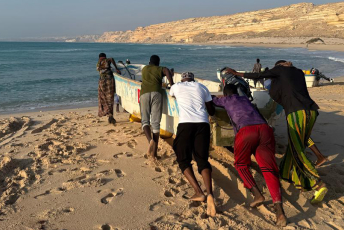Lake Turkana in Northern Kenya is losing hundreds of tonnes of immature tilapia fish monthly through smuggling. Harvesting these fish threatens the existence of the entire species in, and the unique ecology of, the world’s only permanent desert lake.
It further threatens the food security of local communities who depend on tilapia as a source of food and income, and leads to loss of revenue by both the Turkana county and Kenya’s national governments.
In November 2021, the Ugandan Fisheries Protection Unit confiscated 300 tonnes of immature dry fish worth US$1 712 329 at the Mpondwe border in Kasese District. The fish originated from Kalokol, a town on Lake Turkana’s shore, and were destined for the Democratic Republic of the Congo (DRC).
Recent investigations reveal a regional fish smuggling network comprising Kenyans, Ugandans, Tanzanians and Congolese nationals. This network facilitates the harvesting, transportation and supply of immature fish from Lake Turkana through either Tanzania or Uganda into the DRC. There is a high demand for immature fish – mainly tilapia – in the DRC as they are cheaper than mature fish, a fisheries officer based in Kalokol town told ENACT.
The immature fish from Lake Turkana are caught or trapped by locals for a living. Foreign smugglers often provide locals with loans to purchase boats, nets and fuel, making them complicit in harvesting immature fish to meet foreign demand. The locals then sell to Kenyan traders, who in turn sell the fish to foreign nationals who provide transportation to regional markets.
Tobias Okeyo, a clearing and forwarding agent at the Sirare border between Kenya and Tanzania, told ENACT that immature fish were often transported from Kalokol to Sirare on Kenyan trucks. The fish are then loaded onto Tanzanian trucks that ferry them to Nakonde town at the Tanzania-Zambia border. From there, they are loaded onto Zambian trucks that take them to the DRC over the Kasumbalesa border.
To preserve the immature fish for the long journey from Northern Kenya to the DRC, the traders use Sevin dudu dust, an insecticide that kills maggots – and can harm consumers. Turkana’s public health department was recently granted permission by the court to destroy five tonnes of dry fish due to its preservation using the insecticide. Preservation of food using insecticides is against Kenyan public health regulations.
Investigations by the Daily Nation show that the illicit trade in immature fish is both facilitated and protected by state authorities in Kenya and other government officials along the illicit value chain from its source and into to the DRC.
The Kenyan Fisheries Act outlaws the harvesting and trade in undersized fish. However there is no enforcement and several loopholes in compliance, mostly as a result of corruption among fisheries officers. One officer told ENACT that the law required fish traders to obtain a fish trader’s licence and fish movement permit, but that foreign nationals often obtain these through Kenyan intermediaries. The Kenyan Fisheries Act requires those exporting fish to comply with several regulations including the fish export and health permits.
He also explained that smugglers often obtain fish movement permits from non-fish-producing counties in Kenya that are needed for transportation. County governments are mandated to issue such permits. The officer cited cases where smugglers moving fish from Turkana County to Sirare at the Kenya-Tanzania border were found in possession of fish movement permits from Trans-Nzoia County, which does not produce fish.
While showing these permits makes the movement of the immature fish appear legal, obtaining them from non-fish-producing areas is only possible through corruption. Smugglers work closely with compliance officers to obtain these licences.
The first line of protection is largely absent. There appears to be little political willingness to enforce the Fisheries Act to protect fish species and the undersized tilapia in Lake Turkana from irregular harvesting. Operational enforcement has also been limited. The removal of the Kenya Coast Guard and Marine Police from patrolling the 256 km shoreline of the lake, due to conflicts with the Fisheries Department over their respective mandates emboldens smugglers. Both regulatory and operational enforcement limitations only increase ecological and economic harms in this sensitive ecosystem.
Preventing and controlling the illegal trade also requires a regionally coordinated effort by the East African Community to inspect trucks carrying fish from Kenya. This needs the enforcement of the fish handling, processing and distribution code of practice, which is in place but is not enforced in the East African Community.
Regional efforts to stem the smuggling of immature fish from Lake Turkana to the DRC would ensure food security for local households. It would further enhance the regeneration of the tilapia species, thus conserving the world’s only desert lake.
Willis Okumu, Senior Researcher, Eastern Africa, ENACT Project, ISS








